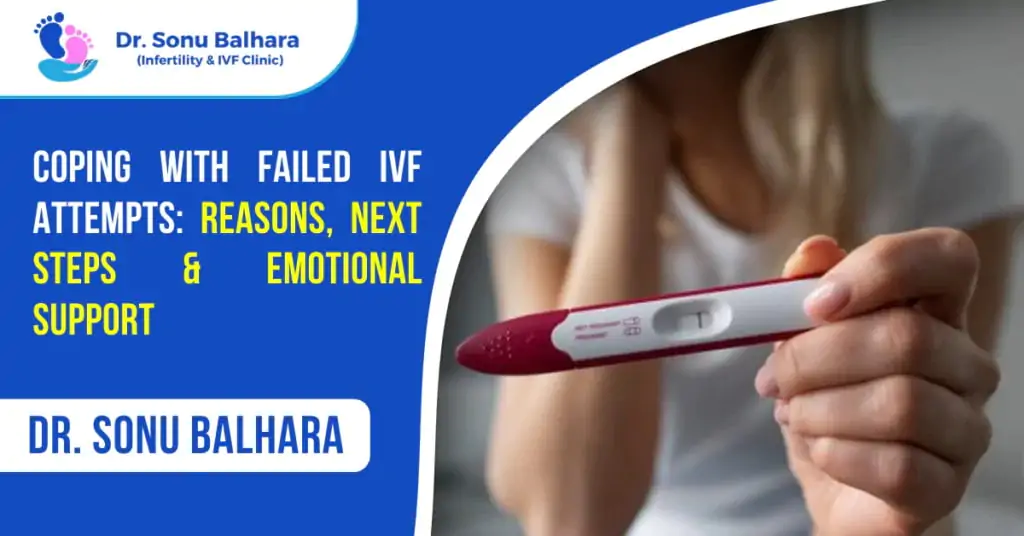Going through IVF (In Vitro Fertilization) is an emotional and physically demanding journey. While success rates have improved over the years, not every IVF attempt results in pregnancy. A failed IVF cycle can be disheartening, but it is important to remember that it does not mean the end of your parenthood journey. Understanding the reasons behind an unsuccessful attempt, learning about the next steps, and seeking emotional support can help in moving forward with confidence.
Why Do IVF Cycles Fail?
There are multiple reasons why an IVF attempt may not be successful. Some of the most common factors include:
- Poor Embryo Quality
- Despite successful fertilization, embryos may not develop properly or fail to implant.
- Genetic abnormalities can lead to implantation failure or early miscarriage.
- Implantation Issues
- Even a high-quality embryo may not implant due to issues with the uterine lining.
- Conditions such as endometriosis, fibroids, or an immune response can prevent successful implantation.
- Egg Quality Concerns
- Age-related factors or underlying ovarian conditions may result in poor egg quality.
- Poor-quality eggs lead to weak embryos that fail to sustain pregnancy.
- Sperm Quality Problems
- Low sperm motility, DNA fragmentation, or abnormalities in sperm structure can affect embryo viability.
- Hormonal Imbalances
- Improper levels of estrogen and progesterone can impact uterine receptivity.
- Thyroid disorders and insulin resistance (common in PCOS) may also contribute to failure.
- Uterine Abnormalities
- Thin endometrial lining, polyps, adhesions, or infections can prevent embryo attachment.
- A specialized test like hysteroscopy may help detect such issues.
- Ovarian Hyperstimulation Syndrome (OHSS)
- Over-response to fertility medications can create an unfavorable uterine environment for implantation.
- Lifestyle Factors
- Obesity, smoking, excessive alcohol consumption, and high stress can negatively impact IVF outcomes.
What Are the Next Steps After a Failed IVF Attempt?
A failed IVF attempt does not mean giving up on parenthood. Here’s how you can move forward:
- Consult Your Fertility Specialist
- A detailed discussion with your doctor can help analyze the reason behind the failure.
- Your specialist may recommend additional tests like ERA (Endometrial Receptivity Analysis) or PGT (Preimplantation Genetic Testing) for better insights.
- Make Necessary Lifestyle Changes
- Weight management, a balanced diet, regular exercise, and stress reduction can improve future success rates.
- Consider Alternative IVF Protocols
- Based on the findings, your doctor may suggest a modified stimulation protocol, donor eggs, sperm selection techniques, or frozen embryo transfer (FET) for better results.
- Explore Other Fertility Treatments
- Intrauterine Insemination (IUI), surrogacy, or donor embryo adoption could be alternative options depending on your case.
Emotional Support & Coping Strategies
The emotional toll of a failed IVF cycle can be overwhelming. Here’s how to cope effectively:
- Allow Yourself to Grieve
- It’s natural to feel sadness, frustration, or even anger. Give yourself time to process these emotions.
- Seek Professional Counseling
- A fertility counselor or psychologist can provide emotional support and coping strategies.
- Join a Support Group
- Connecting with others who have experienced similar struggles can provide comfort and motivation.
- Communicate with Your Partner
- Open discussions about feelings, concerns, and future plans can strengthen your emotional bond.
- Practice Stress-Relief Techniques
- Meditation, yoga, deep breathing, or journaling can help manage anxiety and stress.
Final Thoughts
A failed IVF cycle can be deeply painful, but it does not define your fertility journey. Many couples achieve success after multiple attempts with the right modifications and support. If you have faced an unsuccessful IVF attempt, consult Dr. Sonu Balhara’s IVF Clinic for a thorough evaluation and personalized treatment plans.
Stay strong, stay hopeful – your journey to parenthood is not over yet.

